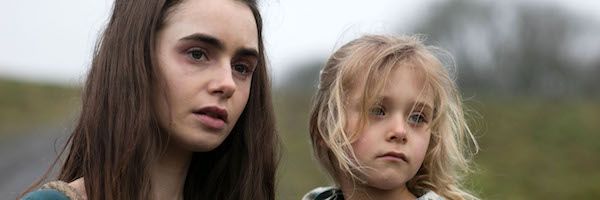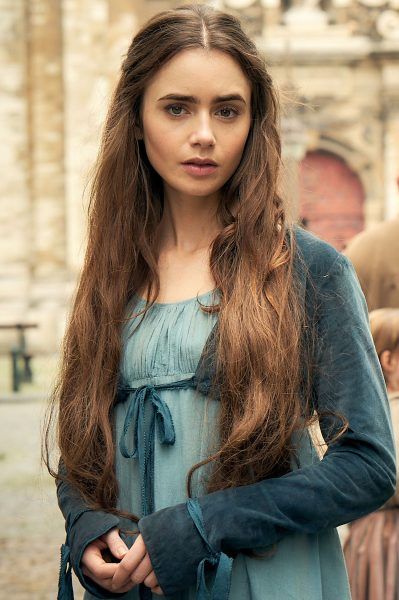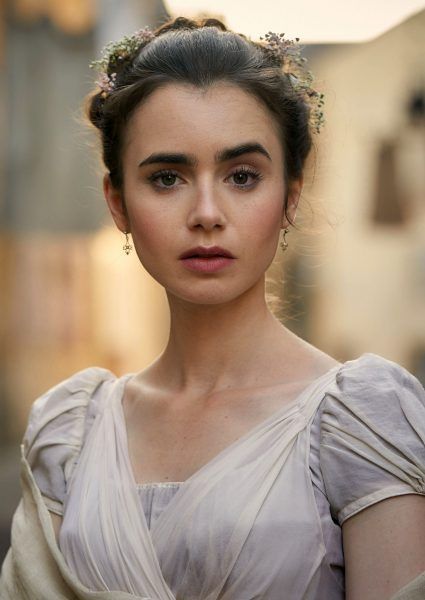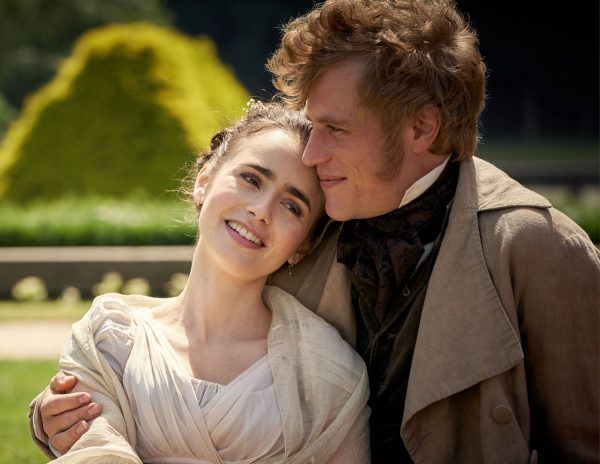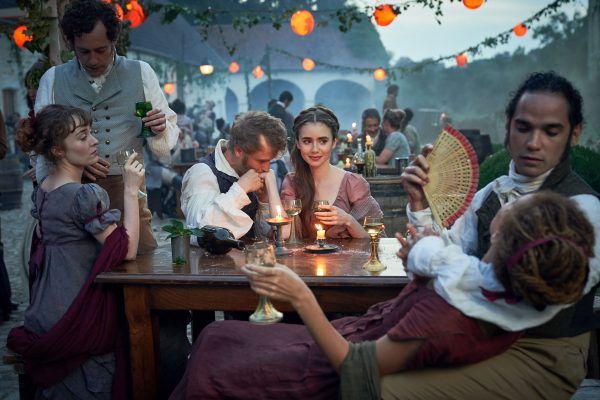From award-winning screenwriter Andrew Davies, the latest dramatic adaptation of Les Misérables (airing on Masterpiece on PBS) is a six-part epic story that delves deep into the many layers of Victor Hugo’s story. Exploring the cat-and-mouse relationship between Jean Valjean (Dominic West) and Javert (David Oyelowo) with a modern relevancy in its powerful themes, plotting and characterizations, all set against the backdrop of France at a time of civil unrest.
During this 1-on-1 interview with Collider, actress Lily Collins (who plays the tragic seamstress Fantine) talked about the incredible experience she had making Les Misérables, the unexpected way they shot the episodes, why it was a gift to get to explore all of the characters so much deeper with the extra hours to tell this story, her first introduction to the story, and staying in Europe to explore some of the surrounding areas once the shoot wrapped. She also talked about her experience making Tolkien and what a huge The Lord of the Rings fan she is, as well as her desire to do comedy, even though it makes her nervous.
Collider: You’ve certainly been amassing a very interesting collection of characters.
LILY COLLINS: Oh, thank you! I know. My friends are like, “Couldn’t you maybe just do a comedy?” And yes, it’s a dream. I wanna do a comedy. Something more lighthearted, for a second, would be nice.
Is comedy something that you’ve actually tried to actively seek out?
COLLINS: No, it’s something that I now am wanting to put out there. I would love to do a comedy. I love comedies. I love old school comedies, and new comedies. In order to appreciate the darker stories, it’s always nice to have the lighter. My friends hear about all of these filming experiences, where I’m off on these different locations, shooting these characters that have tragic stories, or that have tragedy but end in positivity, and they’re like, “Just do a film that we can go to, on a Saturday night, and watch and laugh about it.” One day, I’ll get there.
Does comedy make you nervous?
COLLINS: Yes. There are so many different forms of comedy. There are so many ways to make someone laugh, and sometimes things are not funny. It’s a different world. But just like being surrounded by David [Oyelowo] and Dominic [West] on [Les Misérables], to be surrounded by the best comedians would only teach me more. I feel like it would maybe help raise my game, with the ability to improv. When you’re faced with anyone at the top of their game, it makes you wanna be better. It also just helps you be more in the moment ‘cause you’re not worried about what they’re thinking. They’re just on it, and that really helps. With [Les Mis], some of the dramatic moments, where my character is having to flail for her life and begging for her life on the floor, I can’t think about any of the peripheral distraction. You just have to be so focused in on the other person, when that person is giving you everything. Whether that’s in comedy or drama, it’s a huge gift ‘cause then it allows you to just give of yourself, so much more. It’s a blessing. Comedy is just a different beast, but it’s still a beast that I wanna be able to be a part of.
When you finished this, what did you go do?
COLLINS: It’s interesting, in the beginning, I was really quite frustrated with the order that we were shooting this in, but then, I actually ended up loving it. I did Tolkien, in the end of 2017. Then, I did the table read for this in January 2018, went straight home to L.A. and packed, and then went off to Kentucky and did Bundy (Extremely Wicked, Shockingly Evil, and Vile). Then, I went back to L.A. and had three days, unpacked and re-packed, and then went to Brussels and started shooting this. I had no idea where I was, but I honestly think that helped so much. Extremely Wicked, Shockingly Evil, and Vile was dark, so going from that mind-set into this one was really helpful ‘cause it wasn’t like I was shooting some comedy and had to backtrack, all of a sudden. My second day of filming on this was the deathbed scene in Episode 3. I literally started at the end of Fantine’s life, in the dead of winter, and then go back in the summer, where I then had Episode 1, when you meet her, and she’s young, naive and falling in love. At first, I thought, “Oh, my god, I’m starting this at the end. No pressure there. I don’t even know where I’ve come from, to know where I’m ending.” I didn’t think that was ideal. But then, it actually turned out to be perfect ‘cause not only was it minus temperatures and snowing, and she’s wearing minimal clothing, but I looked so sick and decrepit. I had never really spend that much time in Brussels, so I was feeling all of these feelings that Fantine would have been feeling, which was brilliant. I try to use my surroundings and my feelings for the betterment of the character, and I got to take it all the way to the end and see the worst, before stepping away for about a month and going back in the summer, when it was 95 degrees, and sunny and beautiful. When I went back, I got to shoot all of her beginning, and because I knew how bad it got, I got to make the happy side 10 million times happier, just to show the distinct polarities between the two. I think starting in the middle would’ve been the worst because not knowing where you started or where you’re ended would mean that you wouldn’t know how far to take it. I was so happy to end in the summer, on a happier note, because I was more back to myself than I would have been, if I’d ended with the death sequences. I was already in Europe, so I just stayed in Europe and took a little vacation with a friend of mine. We went to Italy, and attended a film festival and just detoxed a little bit. And then, I went back to L.A.
It seems like it would have been so hard to end with her death, and then have to walk away.
COLLINS: It would have been too finite. I would have needed to completely revamp myself and come back to some reality. But because I had that break, in between, to go back home before going back in the summer, I was able to become excited to go back, knowing it would just be a completely different environment. I was gonna have friends because Fantine has friends, so there were gonna be younger people that I could go exploring Brussels with. Also, during the summer, I found out that you can just take trains and hop around to different castles and explore Brussels for the beauty of what Belgium has to offer, as opposed to holding myself away and being somewhat depressed because Fantine was depressed. I didn’t want people visiting. I was like, “I love you mom, but please don’t come visit me because I think [the isolation] is actually really helping.” She’s alone in the world, so I was like, “I’m just gonna hole away, for a second.” It required that.
It sounds like a pretty incredible experience, overall.
COLLINS: I grew up in Europe, but I never had that experience of backpacking around Europe, or taking a train somewhere, just because. On this, I made a friend for life in the hair and make-up department, and when the schedule permitted or on weekends, we would just take a bag and get on the train in the morning and go to Antwerp, Bruges or Ghent, and visit castles and cathedrals, or just go eat somewhere different, and then come back. It was a version of just hopping around Europe with a backpack. I went to England, and I went to France. The fact that, within an hour and a half, you could be in a different country, and they didn’t even ask for my passport, was amazing. I really felt like I got to have this epic adventure while shooting an epic adventure. It was great.
When you have so many extra hours to explore this story, does it seem like such a gift, as an actor, to get to go so much deeper than we typically get to see in film versions?
COLLINS: Oh, yeah. It’s written in the novel, but you’ve only really heard about her falling in love and having a child through a song lyric. With this not being a musical version, it enabled us to see more of the drama. It’s a six-parter, so you get many more hours with the ability to show more, especially for Fantine. In the film version, you usually cut into her life, half-way through when she’s already working in the factory. I was excited because Tom [Shankland], our director, was very much about inserting bits of myself into Fantine. What does her naive, youthful, more loving side, at the beginning, look like? When she’s meeting this guy, what does is that scene like? When she has Cosette, what is she like as a mother? How does she hold her baby? How does she calm her down? Those were all these things that we got to discuss and decide together. At least we’re not singing, so you can’t have that comparison. We haven’t really seen any of these scenes before. To me, that was actually really exciting. There’s more screen time to figure out who she is. All of that would’ve been backstory, which is great, but I got to live it out. I think that also allows the audience to have more empathy for her, at the end, when you’ve seen her get left. You’ve seen those moments where she’s hopeful, so the audience will be like, “No. Don’t open the door. Don’t go in the dark. Don’t go into the dungeon. Don’t fall for him ‘cause he’s gonna leave you.” Because we all know the story so well, to allow the audience to have more empathy for her, at the end, is made stronger by the fact that they get to fall in love with her, at the beginning. That allowed me to know where I was going, and where I had been, in order to have those deep polarities, and to create such an arc for a character. It’s six episodes, and I die in Episode 3. Even though she’s only in half, what you’re left with of her has to help propel Jean Valjean, for the rest of the story, so you need to see all of those sides of her, that provided for that lightness in her, just to believe the story, as much as you can.
What was your first introduction to Les Mis?
COLLINS: Being in school and going to the library. I used to go to the library a lot, to do research for projects, before the internet was really big. Wikipedia was not a valid source for your bibliography then, so you needed to go to the library and source it. I was always at the library, and Les Mis was always there. You can’t miss it. It’s so massive, but it’s also such a classical story that’s well-renowned. You’d hear about it in school, especially talking about the French Revolution and post-revolutionary France. It’s so historical and it’s based in so much history, that it was impossible not to know about it. And then, growing up in the West End and seeing the musical, it’s the longest running musical. And then, it was in the States. So, if you’re a lover of literature and entertainment, in whatever capacity, it’s impossible not to know what Les Mis is. And I had friends in the musical movie, so I had heard about that and their experience doing it. I just never knew that it would ever come around to me. Had I known that, in elementary school and high school, I probably would have done more highlighting and taking notes. Knowing and deeply respecting it, but never expecting to be in it, was the best attitude to have. I felt like I had grown up around it, but at the same time, knew very little of what my character would go through, at least from the beginning. It was a really nice introduction to it, in a new way. So, I felt like it had always been there, and yet there was still so much to learn, that I could almost start from the ground up with Tom. He didn’t overly encourage watching any of the previous renditions again. It was really novel-based, with deep discussions about how we felt the scenes should go.
While it’s such an epic story that must be a dream to tackle, it also seems terrifying.
COLLINS: Yeah, there definitely was an anxiety portion of it, just because I always wanna give 110%, with whatever I do. This character required the physicality and the emotion of 110%, all the time, especially in the later part of her life. So, I was really excited to see where I would be able to go with it, just to know what I’m capable of, but also to allow the character to live and breathe, in a new way. It’s something that I will never forget shooting. Everything about it is just so stunning. Some moments are like paintings. It’s just beautiful. I’m really happy with it.
What was your experience making Tolkien like?
COLLINS: That was actually really fun. I’m a huge fan of The Lord of the Rings and The Hobbit. I love anything magical, like The Lord of the Rings, Harry Potter, and any of that. I’m like, “Just give me a marathon.” But, I didn’t know much about Tolkien. I had actually auditioned for one of the elven characters in the last The Lord of the Rings films, but I obviously didn’t get it. It’s ironic that I ended up playing the woman that inspired the elven characters and the elven queen. I’ve been a huge fan of Nicholas Hoult for years. I’ve known him socially, and he’s just such a wonderful person. So, when I heard that he was doing it, I was interested. And our director, Dome [Karukoski], is such a visionary and so passionate about what he does. With the aesthetics that he wanted to bring to this movie, I thought the way that he was gonna blend the fantasy world of Tolkien and the reality of his life was such an interesting marriage. It could have gone in many different ways and been either too fantasy-based, or it didn’t weave the two correctly. But the way that he wanted to tell it was so inspiring that I thought, “This is the way that I’d want to tell the story.” And it’s Fox Searchlight and their taste in movies is so interesting. The way that they tell these stories behind the stories about authors is so fascinating. As a kid that grew up reading, I hope reading doesn’t ever die out. Reading is becoming less and less of a thing for kids, in terms of holding a book, and I remember holding books, and going to the library and just immersing myself in these worlds. The Lord of the Rings was a huge part of that ‘cause it had so much fantasy. So, to be able to bring it to a new audience, in a way of better understanding where it all came from, humanizes the stories in a way that we haven’t seen before. And we got to shoot in Liverpool, which was really fun. I’d never been up there. We also had a really fun cast, with a lot of young people that are fascinating. It was a really fun period drama. Les Mis is quite dramatic. With this, you really get to see a young couple that’s growing up and figuring out who they are, and encouraging one another to embrace those quirks that people don’t normally understand. There’s a lot that can be understood through Tolkien about today’s society. It’s a very modern story, just set in a different time.
Les Misérables airs on Sunday nights on Masterpiece on PBS.

